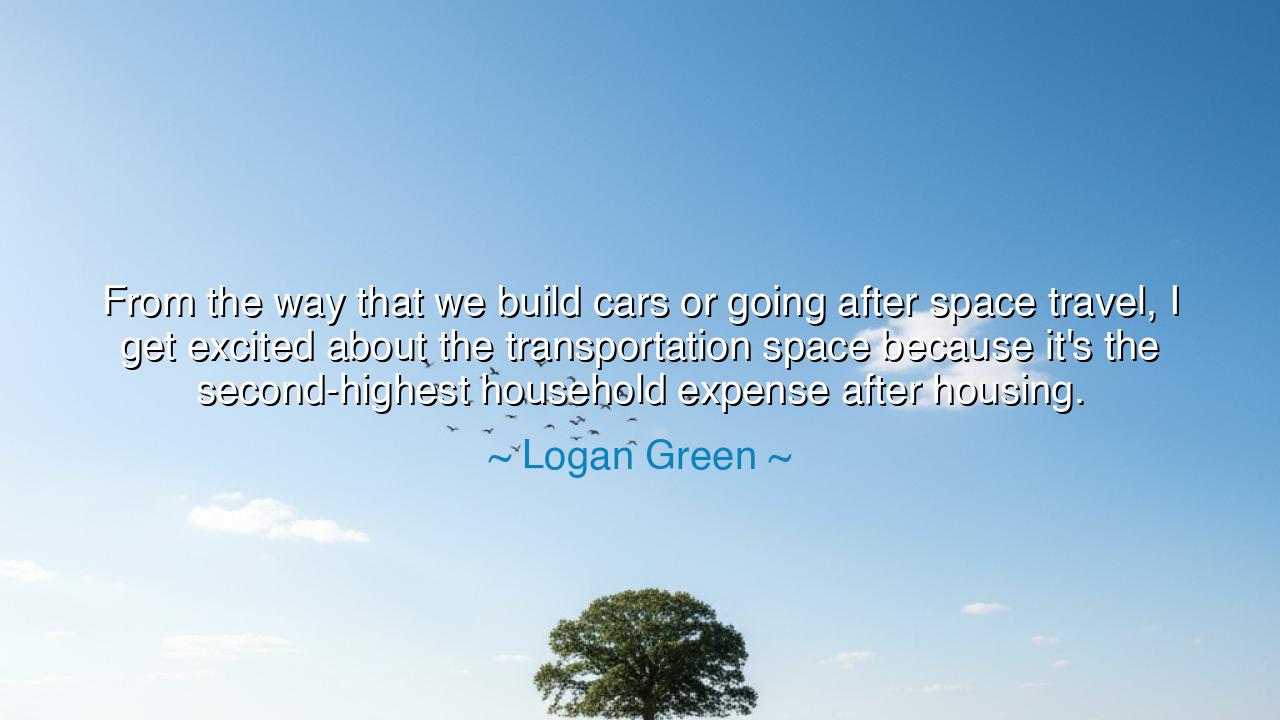
From the way that we build cars or going after space travel, I
From the way that we build cars or going after space travel, I get excited about the transportation space because it's the second-highest household expense after housing.






Hear the words of Logan Green, builder of paths and dreamer of new roads: “From the way that we build cars or going after space travel, I get excited about the transportation space because it's the second-highest household expense after housing.” At first, these words seem as those of a merchant or engineer, speaking of markets and costs. Yet beneath them lies a revelation: that transportation, the very act of moving from one place to another, is not merely a burden of coin but the pulse of human progress. To master it, to make it lighter, cheaper, and freer, is to grant people not only wealth but also time, opportunity, and freedom itself.
For since the dawn of civilization, transportation has shaped the destiny of peoples. Rivers became highways for trade, horses carried messages of kings, ships carried explorers to unknown lands. The building of railroads bound continents together, and the rise of the automobile gave individuals the power to shape their own journeys. Yet with every advance came cost—time, resources, and toil. Green sees in this not only the hardship but the opportunity: that by reimagining how we move, we may transform how we live.
History offers us many examples. Consider the Roman Empire, whose strength did not rest only in legions and swords, but in its roads. The Roman roads, built with tireless labor, gave merchants speed, gave armies reach, gave the empire its unity. They were costly, yes, but their worth was greater still: they wove together provinces and peoples into one civilization. Even today, remnants of those paths remain, a testimony to the truth that to change transportation is to change the course of history.
In our age, we have seen similar revolutions. The automobile, once a luxury, became common in households, altering the shape of cities, spreading suburbs across the land. Yet with it came expense, pollution, and the endless sacrifice of time in traffic. Then arose new visions—public transit systems, ride-sharing platforms, even the quest for rockets that might carry humankind between planets. Green’s words echo here: transportation is not only an industry, it is the great frontier of cost and possibility, the place where human lives may be freed or shackled.
The heart of his wisdom lies in this: if transportation is the second-greatest burden after shelter, then to ease it is to uplift millions. A cheaper, safer, more efficient way to move means more than convenience—it means liberation. It gives workers time with their families instead of time in traffic. It gives the poor access to opportunities once too distant. It expands the reach of education, trade, and community. Thus, to reimagine transportation is not only an economic act, but a moral one.
Let us learn from this. Too often we see the car, the bus, the train as mere machines, tools that take us from one place to another. But look deeper, and see them as vessels of freedom or chains of expense. The visionary does not accept the cost as inevitable; he asks how to transform it. So must we in our own lives: to look at the great expenses of our time—not only in money but in energy and spirit—and ask how they may be reimagined, reshaped, redeemed.
Therefore, O seekers of wisdom, do not dismiss the struggles of daily travel as trifles. They are the hidden battles of life, shaping our days and draining our strength. Seek out ways to move with less burden. Support innovations that free people from the weight of expense. Dream of roads, rails, and skies where movement is not a hardship but a gift. For as Logan Green teaches, to transform transportation is to transform life itself—and in doing so, to bring humanity one step closer to freedom.






AAdministratorAdministrator
Welcome, honored guests. Please leave a comment, we will respond soon